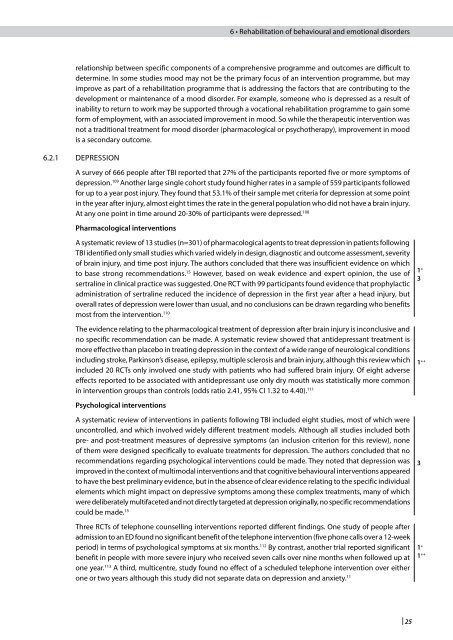sign130
sign130
sign130
You also want an ePaper? Increase the reach of your titles
YUMPU automatically turns print PDFs into web optimized ePapers that Google loves.
elationship between specific components of a comprehensive programme and outcomes are difficult to<br />
determine. In some studies mood may not be the primary focus of an intervention programme, but may<br />
improve as part of a rehabilitation programme that is addressing the factors that are contributing to the<br />
development or maintenance of a mood disorder. For example, someone who is depressed as a result of<br />
inability to return to work may be supported through a vocational rehabilitation programme to gain some<br />
form of employment, with an associated improvement in mood. So while the therapeutic intervention was<br />
not a traditional treatment for mood disorder (pharmacological or psychotherapy), improvement in mood<br />
is a secondary outcome.<br />
6.2.1 DEPRESSION<br />
A survey of 666 people after TBI reported that 27% of the participants reported five or more symptoms of<br />
depression. 109 Another large single cohort study found higher rates in a sample of 559 participants followed<br />
for up to a year post injury. They found that 53.1% of their sample met criteria for depression at some point<br />
in the year after injury, almost eight times the rate in the general population who did not have a brain injury.<br />
At any one point in time around 20-30% of participants were depressed. 108<br />
Pharmacological interventions<br />
A systematic review of 13 studies (n=301) of pharmacological agents to treat depression in patients following<br />
TBI identified only small studies which varied widely in design, diagnostic and outcome assessment, severity<br />
of brain injury, and time post injury. The authors concluded that there was insufficient evidence on which<br />
to base strong recommendations. 15 However, based on weak evidence and expert opinion, the use of<br />
sertraline in clinical practice was suggested. One RCT with 99 participants found evidence that prophylactic<br />
administration of sertraline reduced the incidence of depression in the first year after a head injury, but<br />
overall rates of depression were lower than usual, and no conclusions can be drawn regarding who benefits<br />
most from the intervention. 110<br />
The evidence relating to the pharmacological treatment of depression after brain injury is inconclusive and<br />
no specific recommendation can be made. A systematic review showed that antidepressant treatment is<br />
more effective than placebo in treating depression in the context of a wide range of neurological conditions<br />
including stroke, Parkinson’s disease, epilepsy, multiple sclerosis and brain injury, although this review which<br />
included 20 RCTs only involved one study with patients who had suffered brain injury. Of eight adverse<br />
effects reported to be associated with antidepressant use only dry mouth was statistically more common<br />
in intervention groups than controls (odds ratio 2.41, 95% CI 1.32 to 4.40). 111<br />
Psychological interventions<br />
6 • Rehabilitation of behavioural and emotional disorders<br />
A systematic review of interventions in patients following TBI included eight studies, most of which were<br />
uncontrolled, and which involved widely different treatment models. Although all studies included both<br />
pre- and post-treatment measures of depressive symptoms (an inclusion criterion for this review), none<br />
of them were designed specifically to evaluate treatments for depression. The authors concluded that no<br />
recommendations regarding psychological interventions could be made. They noted that depression was<br />
improved in the context of multimodal interventions and that cognitive behavioural interventions appeared<br />
to have the best preliminary evidence, but in the absence of clear evidence relating to the specific individual<br />
elements which might impact on depressive symptoms among these complex treatments, many of which<br />
were deliberately multifaceted and not directly targeted at depression originally, no specific recommendations<br />
could be made. 15<br />
Three RCTs of telephone counselling interventions reported different findings. One study of people after<br />
admission to an ED found no significant benefit of the telephone intervention (five phone calls over a 12-week<br />
period) in terms of psychological symptoms at six months. 112 By contrast, another trial reported significant<br />
benefit in people with more severe injury who received seven calls over nine months when followed up at<br />
one year. 113 A third, multicentre, study found no effect of a scheduled telephone intervention over either<br />
one or two years although this study did not separate data on depression and anxiety. 11<br />
| 25<br />
1 +<br />
3<br />
1 ++<br />
3<br />
1 +<br />
1 ++


